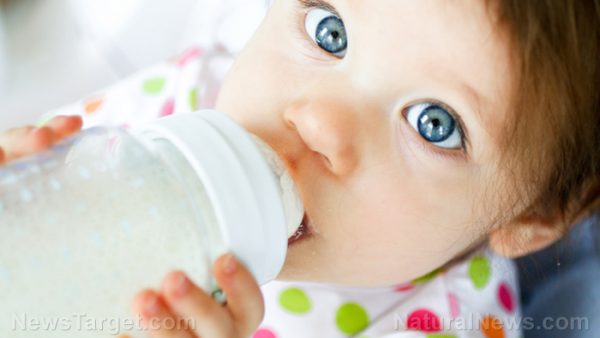 Parler
Parler Gab
Gab
Cronobacter is usually harmless but can be fatal to infants and vulnerable individuals
According to the FDA website, cronobacter is a germ (bacteria) naturally found in the environment. Cronobacter can exist on almost any surface and is especially good at surviving in dry foods, like powdered infant formula, powdered milk, herbal teas and starches. "Cronobacter is harmless for most people and infections are rare. When they occur, they can be life-threatening in infants, particularly those younger than two months old, premature, immunocompromised or of low birth weight," the FDA website included. Infections in very young children typically occur in the first days or weeks of life. Still, it can endanger the lives of vulnerable individuals, such as the elderly or those aged 65 years and older as well as those who have weakened immune systems, such as individuals with HIV, organ transplants or cancer. The CDC said there are roughly two to four cases of cronobacter infections reported every year, although the agency added that the actual figure may be higher. Symptoms of the infection in infants may start with fever, poor feeding, excessive crying and/or very low energy. Some infants may also have seizures. The FDA advises that babies with these symptoms should be taken to a medical provider as soon as possible. The FDA reminded caregivers to be extra careful in preparing milk formulas by following the manufacturer's instructions included on the packaging, especially for specialty metabolic formulas. Also, as infants could be exposed to infection via unclean breast pumps or bottles, they should keep your baby's food, whether breast milk or formula, safe by carefully cleaning, sanitizing and storing bottles and breast pump parts. "It is also important to wash your hands with soap and water, especially before preparing bottles and feeding. The CDC says that alcohol-based hand sanitizer with at least 60 percent alcohol can also be used," the fact sheet included. Watch the video below that talks about Abbott's voluntary recall of the formula that contributed to the shortage. This video is from the KristiLeighTV channel on Brighteon.com.More related stories:
Parents of babies with allergies are struggling due to baby formula shortage. FDA to help foreign baby formula makers sell their products beyond current shortage. Worsening baby formula SHORTAGE hits ten states, low-income families. "I can't feed my son!" Baby formula shortage reaches critical stage in US as desperate parents search for rationed supplies.Sources include:
TheEpochTimes.com FDA.gov 1 CDC.gov CBSNews.com FDA.gov 2 Brighteon.comFrench study looks at potential for fully covid jabbed to “shed” byproducts onto others
By Ethan Huff // Share
JetBlue hires violent felon to fly planes while discriminating against unvaccinated pilots
By Ethan Huff // Share
At least 750,000 people in 38 countries have “died suddenly” after COVID vaccination this year
By Kevin Hughes // Share
Woman injured by Pfizer COVID-19 shot feels “damaged for life”
By Olivia Cook // Share
Getting COVID-19 vaccines is a risk potential recruits are not willing to take, says ex-serviceman
By Belle Carter // Share
Governments continue to obscure COVID-19 vaccine data amid rising concerns over excess deaths
By patricklewis // Share
Tech giant Microsoft backs EXTINCTION with its support of carbon capture programs
By ramontomeydw // Share
Germany to resume arms exports to Israel despite repeated ceasefire violations
By isabelle // Share










